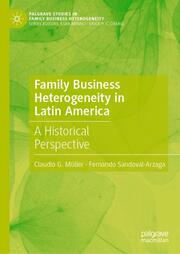Detailansicht
Family Business Heterogeneity in Latin America
A Historical Perspective, Palgrave Studies in Family Business Heterogeneity
ISBN/EAN: 9783030789305
Umbreit-Nr.: 2408477
Sprache:
Englisch
Umfang: xix, 147 S., 1 s/w Illustr., 11 farbige Illustr.,
Format in cm:
Einband:
gebundenes Buch
Erschienen am 19.08.2021
Auflage: 1/2022
- Zusatztext
- This book explores the emergence and evolution of family firms throughout Latin America, from the colonial period to the modern day. In the course of Latin American history, institutions evolved to create order and reduce the uncertainty of the market. Using institutional change theory, social capital theory in organizational settings and resource-based view as organizing frameworks, the authors show how differences among family business in the region developed by examining the influx of foreign settlers, the shift from state-owned enterprises to privatized family business groups, and the effect of globalization. This text, presenting cases of family firms across several countries, offers entrepreneurship scholars a fresh perspective of a neglected region.
- Kurztext
- The authors have done what we should all have been doing in studying families in business - they have documented how the larger social, legal, economic environments impact the formation and growth of family enterprises. I hope scholars learn the lessons this book has to offer. -Frank Hoy, Beswick Professor of Innovation and Entrepreneurship, Foisie Business School, Worcester Polytechnic Institute, USA.The authors of this must-read book are to be complemented for bringing to life migratory flows and idiosyncratic fascinating journeys of families featured in it! A delightful thought-provoking reading! -Pramodita Sharma, Schlesinger Grossman Chair of Family Business, Grossman School of Business, University of Vermont, USAThis book explores the emergence and evolution of family firms throughout Latin America, from the colonial period to the modern day. In the course of Latin American history, institutions evolved to create order and reduce the uncertainty of the market. Using institutional change theory, social capital theory in organizational settings and resource-based view as organizing frameworks, the authors show how differences among family business in the region developed by examining the influx of foreign settlers, the shift from state-owned enterprises to privatized family business groups, and the effect of globalization. This text, presenting cases of family firms across several countries, offers entrepreneurship scholars a fresh perspective of a neglected region. Claudio G. Müller is Professor of Management at School of Business and Economics at University of Chile. He is co-editor of Family Firms in Latin America (2018). Fernando Sandoval-Arzaga is Academic Director of the Institute of Enterprising Families for Mexico and Latin America at the Tecnologico de Monterrey, Mexico.
- Autorenportrait
- Claudio G. Müller is Professor of Management at School of Business and Economics at University of Chile. He is co-editor of Family Firms in Latin America (2018). Fernando Sandoval-Arzaga is Academic Director of the Institute of Enterprising Families for Mexico and Latin America at the Tecnologico de Monterrey, Mexico.
